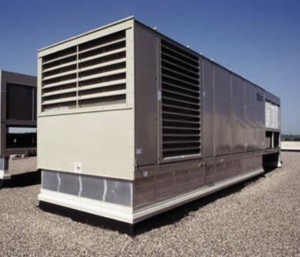
June 2021 Newsletter
The U.S. Energy Information Administration states that in across all building types, electricity accounts for the lion’s share of energy use in commercial buildings at 61%. Of the electricity used in buildings, lighting accounts for 17%, followed by refrigeration and ventilation at 16%, then cooling at 15%. On average, 30% of the energy used in commercial buildings is wasted due to inefficiencies, according to the U.S. Environmental Protection Agency. With summer upon us it is time to evaluate your building’s HVAC system. There are several factors to consider to guarantee maximum commercial air conditioner efficiency:
- TYPE– When you’re looking at commercial air conditioner units, you should start with choosing the best type of technology for your needs and your space.
WATER-COOLED. If your building has a water-cooled base system, you’ll need to install equipment in your space that ties into the building’s base system and distributes the chilled water throughout your space.
DUCTED SPLIT SYSTEM. This is the traditional type of air conditioner used in single family homes. It has an outdoor condensing unit and a single indoor air handler. It distributes cooled air throughout your space using ducts (often the same ducts that service the heating system). If you already have ducts in your space, this can be a good option for a commercial air conditioner as well.
DUCTLESS. If you don’t have ducts, installing them in an older building can be challenging and expensive. In that case, you can consider a commercial ductless air conditioner that has multiple indoor air handlers in each room. This type of air conditioner is also a good choice for supplementing an existing system (for a computer room, for example).
VARIABLE REFRIGERANT FLOW (VRF). VRF is a newer technology that’s different from a traditional split system. Rather than always operating at full capacity, it can adjust to the operating conditions. That means it’s quieter and more energy-efficient. It can even provide both heating and cooling simultaneously to different areas within your space.
ROOFTOP UNIT (RTU). An RTU provides both heating and air conditioning in a single packaged unit. As the name implies, it’s typically installed on the roof of your building. It’s a great choice for single-story buildings such as warehouses.
2. CAPACITY– Getting the right commercial air conditioner cooling capacity is critically important to how well the unit will perform. The efficiency of air conditioners is often rated by the seasonal energy efficiency ratio (SEER) which is defined by the Air Conditioning, Heating, and Refrigeration Institute. A SEER rating is the ratio of the cooling output of an air conditioner over a typical cooling season, divided by the energy it consumed in Watt-Hours. SEER only takes seasonal use into account, not year-round use. Modern air conditioners have a SEER value ranging from 13 or 14 SEER as a minimum, to a maximum of 21 or 28 SEER. Higher SEER ratings indicate higher levels of energy efficiency. An air conditioner’s SEER number tells you how much energy will be required to run the system and, as a result, approximately how much it will cost each month to operate the air conditioner.
3. COST– When it comes to assessing the cost of a commercial air conditioning system, air conditioner efficiency matters as much as upfront cost. While businesses tend to focus on the price of the AC unit and the cost of installation, it’s better to think of a commercial air conditioner as a long-term investment. A more efficient system will not only cost less to run, thereby saving your business money on monthly utility bills, but will also have a longer lifespan and deliver a higher ROI over time.
To ensure reliable performance, problem-free operation, and energy efficiency on your new commercial air conditioner: Don’t neglect preventative maintenance! This is important because it keeps the parts in good working order and prevents small problems from turning into big ones. The fact is, equipment that’s maintained regularly lasts longer and has fewer repair issues. Focusing on these elements when choosing a new air conditioning unit for your commercial building will help pave the way toward greater energy efficiency (and lower operational or maintenance costs in the future).
Gray Connective is a commercial and industrial electrical contractor serving the greater Lehigh Valley and western New Jersey for over three decades. We offer companies the ability to work with confidence and peace of mind through our electrical solutions and competitive prices.
Contact Gray Connective for more information on how we can help you with your commercial air conditioner.
SUBSCRIBE TO OUR NEWSLETTER

